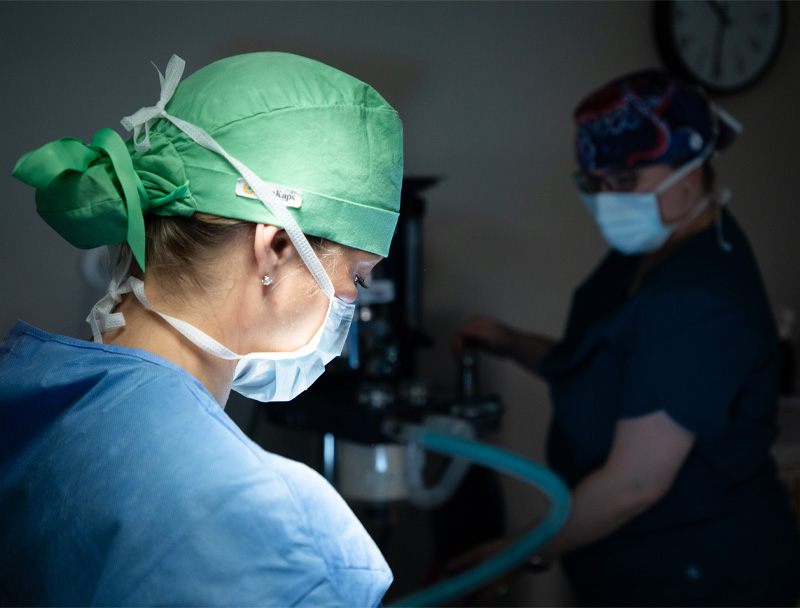
Pet Eyelid & Third Eyelid Surgery in Greenville, SC
Are you noticing your pet squinting, tearing, or showing signs of eye irritation? Conditions affecting the eyelids or third eyelids can lead to vision problems and long-term damage if left untreated.
Specialized Surgical Solutions for Eyelid Conditions
Eyelid abnormalities and third eyelid disorders are more than cosmetic issues — they can cause pain, chronic infections, or even vision loss. At Carolina Animal Eye, our board-certified veterinary ophthalmologists are trained in a wide range of specialized surgical techniques to correct these conditions safely and effectively.
We perform surgery to address:
- Entropion – Inward rolling of the eyelids causing lashes to rub against the eye
- Cherry Eye Surgery – Surgical correction of a prolapsed third eyelid gland
- Eyelid Mass Removal – Safe excision of benign or malignant tumors on the eyelid
- Eyelid Agenesis – Partial or complete absence of eyelid tissue (especially in cats)
- Distichia, Trichiasis, and Ectopic Cilia – Abnormal or misplaced eyelashes irritating the eye
- Scrolled/Bent Third Eyelid Cartilage – Reshaping or repositioning for comfort and normal function
- Eyelid Trauma Repair – Reconstruction following injury or laceration
- Ectropion – Outward drooping eyelids that leave the eye exposed
- Macroblepharon / Macropalpebral Fissures – Overly large eyelid openings, common in certain breeds
Each procedure is tailored to your pet’s specific condition, breed, and overall health to preserve vision, reduce discomfort, and prevent complications.
Why Eyelid Surgery Matters
The eyelids play vital roles in protecting your pet’s eyes, helping distribute tears, removing debris, and shielding the cornea from injury. When these structures are malformed or damaged, they can cause:
- Constant irritation or blinking
- Excessive tearing or discharge
- Recurrent infections
- Corneal ulcers or scarring
- Vision impairment or long-term ocular damage
Surgical correction offers relief from discomfort and long-term protection for your pet’s eyes.

What Is Cherry Eye?
Cherry eye is the common name for a prolapsed third eyelid gland, a condition where the tear-producing gland in a pet’s third eyelid (also called the nictitating membrane) becomes displaced and bulges out of its normal position. This creates a red, swollen mass in the inner corner of the eye, resembling a cherry, hence the name.
Cherry eye is most commonly seen in young dogs and certain breeds, including Bulldogs, Cocker Spaniels, Beagles, Lhasa Apsos, and Shih Tzus. While less common, it can also occur in cats.
Symptoms of Cherry Eye:
- A round, red or pink mass in the inner corner of the eye
- Excessive tearing or discharge
- Eye irritation or pawing at the face
- Swelling or inflammation of the surrounding tissues
Although cherry eye is not typically painful initially, if left untreated, it can lead to chronic inflammation, eye infections, or dry eye (keratoconjunctivitis sicca). The third eyelid gland produces a significant portion of the eye’s protective tear film, so preserving its function is crucial to long-term eye health.
What to Expect
- Comprehensive Eye Exam – We perform a full ophthalmic evaluation to diagnose the condition and determine the best surgical plan.
- Safe Anesthesia & Monitoring – All procedures are performed under general anesthesia with advanced monitoring for your pet’s safety.
- Tailored Surgical Approach – Our veterinary ophthalmologists use microsurgical techniques and specialized instruments to ensure precise, breed-appropriate correction with minimal trauma.
- Postoperative Care & Follow-Up – We provide detailed home care instructions, medication if needed, and follow-up visits to monitor healing and results.
Most pets recover comfortably at home with minimal downtime and significant improvement in eye function and comfort.
If your pet has been diagnosed with an eyelid abnormality, mass, injury, or cherry eye, timely surgical care can restore comfort, prevent complications, and protect vision for years to come.
